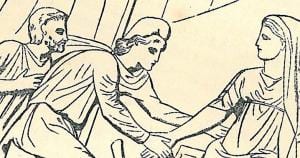 He is so unbelievably shallow, he could only be played by Orlando Bloom: Paris of Troy. He wears leopard skin and as a result slanders this noble beast for the rest of literary time. Helen was so beautiful her face launched a thousand ships, while Paris was so superficial he let Troy burn rather than lose a prize.
He is so unbelievably shallow, he could only be played by Orlando Bloom: Paris of Troy. He wears leopard skin and as a result slanders this noble beast for the rest of literary time. Helen was so beautiful her face launched a thousand ships, while Paris was so superficial he let Troy burn rather than lose a prize.
Iliad is full of passages where Paris lacks any redeeming qualities. He could end the war by doing his duty and dying, but instead boldly runs away in the arms of mighty Aphrodite. Hector has to hector him to go to battle or he would stay in the arms of Helen. Paris lurks on the edges of battle shooting arrows at the brave warriors.
Yet sometimes, less rarely now that a few decades ago, I will have a student that thinks Paris is a winner. After all if Achilles is the greatest warrior, the atom bomb of the ancient battlefield, Paris is “Star Wars” and kills Achilles. The shot may be lucky, and it might happen after Iliad ends, but Paris is proof, the students claim, that is is better to be lucky than good. Paris kills the mightiest warrior, sleeps with the hottest woman, and lives in luxury for the entire war. Paris is a winner to these lads. If fate decrees he must die in the War, even his ex-wife is kills herself when she hears the news.
This is a mistake, even if judged only by Homeric ethics.
Virtue in Homer is excellence. The good man is good at something worthwhile. Achilles is good, because he is a good fighter and fighting is worth doing. Paris is good at nothing meaningful. He makes love, but animals can do this well. He fights, but poorly. He is lucky, but the gods get the credit for his wins. Paris betrays the relationship between a guest and his host, very sacred to the Homeric era Greeks, by stealing Helen. As a result, he is hardly a man in the poem, let alone a hero.
Paris condemns himself at times, as Helen does, but the most powerful condemnation is at the end of Iliad in a scene where Paris does not speak. He is silent before a father’s righteous wrath.
The last time we see Paris (in Iliad) is in Book XXIV when old King Priam goes to rescue the body of his son Hector:
He (Priam) spoke, and drove the men off with his staff; and they went out before the old man’s urgency. And to his own sons he shouted rebuke, railing at Helenos and Paris and brilliant Agathon and Pammon and Antiphonos and Polites of the war cry 250 and Deïphobos and Hippothoös, too, and noble Dios. To these nine, the old man, shouting his threats, gave orders: “Make haste, worthless children, my disgraces. I would the pack of you together had been slain by the swift ship instead of Hector. Woe is me, fated utterly, since I sired the best sons in broad Troy, but I say not one of them is left, Mestor the godlike and Troilos the chariot fighter and Hector, who was a god among men, nor did he seem to be the son of mortal man, but of a god. War destroyed these men, and all these things of shame are left, 260 the liars and dancers, and heroes of the dance floor, snatchers of lambs and kids in their own land. Will you all not prepare a wagon for me at once, and place all these things in it, so that we can go upon our way?” So he spoke; and they trembling before the old man’s threats lifted out the strong-wheeled wagon for the mule, a beautiful thing, newly made, and fastened the wicker carrier on it, and took down from its peg the mule yoke made of boxwood and with a nob upon it, well-fitted with rings to guide the reins; and they brought out the yoke strap of nine cubits length together with the yoke.*
Paris ends up shamed by his father, doing menial work, all so the corpse of his decent, virtuous brother can be rescued for burial. He receives no respect, no honor, and in the end his father leaves with a mule and calls Paris a “thing of shame.” So he is. No great civilization can defend a Paris, the man of passion who lives for personal peace and pleasure.
Paris is authentic: he never is less than Paris. He is true to his desires: when he sees something good, Paris takes that good. Paris is a cad, because he never says “no” to Paris. The man confuses his passions with virtue.
God save us.
——————————-
Homer, Iliad. Book XXIV. Translated by Caroline Alexander.












